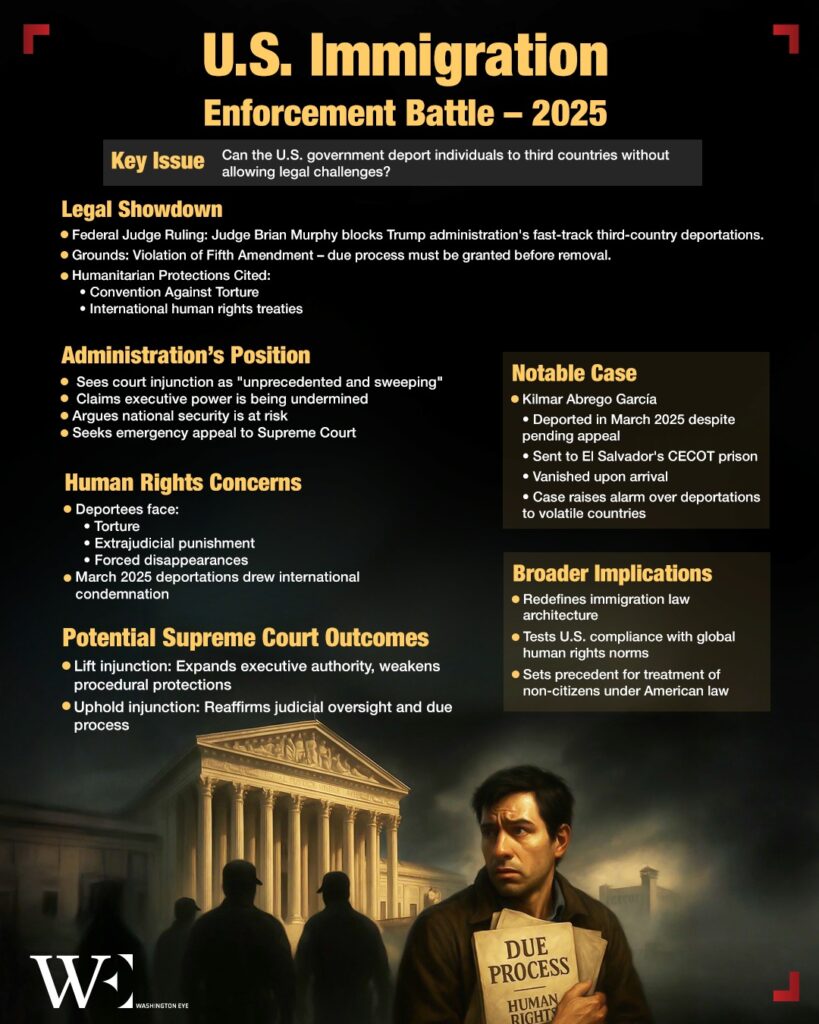The Trump administration has escalated its efforts to reshape U.S. immigration enforcement, now urging the Supreme Court to overturn a federal judge’s restriction on deporting individuals to nations that are not their countries of origin. At the heart of the legal dispute is whether the government can swiftly deport non-citizens—particularly those with criminal convictions—to third countries without granting them time to contest their removal on grounds of possible torture, persecution, or death.
This dispute emerged after U.S. District Judge Brian Murphy blocked the administration’s attempt to carry out such deportations without providing individuals the opportunity to raise legal and humanitarian objections. In his ruling, Judge Murphy emphasized that the Fifth Amendment guarantees due process rights to all individuals, including the right to challenge government decisions that might expose them to grave harm.
The administration, however, contends that such judicial constraints severely impede its ability to carry out immigration enforcement and maintain diplomatic relations with countries reluctant to accept deportees. Officials argue that the court’s intervention constitutes an “unprecedented and sweeping injunction” that undermines executive authority in matters of national security.
Judicial Oversight and Executive Pushback
Judge Murphy’s order demands that individuals being deported to third countries must be granted a formal chance to raise claims under the Convention Against Torture or other international obligations. The court’s stance suggests that summary deportations, especially to nations with known human rights violations, violate not just international norms but also domestic constitutional protections.
The Trump administration’s emergency appeal to the Supreme Court aims to sidestep this ruling and resume what it calls necessary deportations of individuals who pose a public safety risk or have exhausted legal avenues for remaining in the United States. Legal analysts suggest that the administration is leveraging national security rhetoric to justify a policy that potentially places vulnerable people at extraordinary risk.
Human Rights Concerns and International Implications
Beyond the constitutional arguments lies a more visceral concern: the safety of deportees. Human rights organizations have repeatedly warned that deporting individuals to volatile regions—particularly where they lack citizenship or legal ties—can lead to situations akin to forced disappearance or extrajudicial punishment.
The March 2025 deportations to El Salvador’s controversial Terrorism Confinement Center (CECOT), for example, were widely criticized for violating detainees’ rights, with reports of indefinite confinement and lack of judicial recourse. Kilmar Abrego García’s case stands as a grim reminder; deported despite a pending appeal, he vanished shortly after arrival in a country he had fled due to gang violence.
Such incidents underscore the potential consequences of accelerating deportations without thorough procedural safeguards. They also raise questions about the U.S. government’s compliance with international treaties and its moral standing in the global human rights community.
The Supreme Court’s Decision: A Pivotal Moment
The Court’s decision on whether to lift the injunction will shape not only the lives of those currently facing deportation, but also the broader architecture of immigration law in the United States. A ruling in favor of the administration would strengthen executive discretion in removal proceedings, possibly paving the way for further restrictions on immigrant rights. On the other hand, upholding the lower court’s order would reaffirm judicial oversight and due process as cornerstones of American legal tradition.
This moment invites deeper reflection on how the U.S. defines its obligations to non-citizens, balances security with compassion, and aligns its domestic policies with international legal norms.
A Final Note
The Supreme Court’s forthcoming decision will serve as a litmus test for how far the United States is willing to stretch executive authority in the name of immigration control. As legal and ethical considerations collide, the outcome will not only influence the lives of those at risk of removal but also signal the nation’s broader commitment to due process, human dignity, and the rule of law in a global context.














